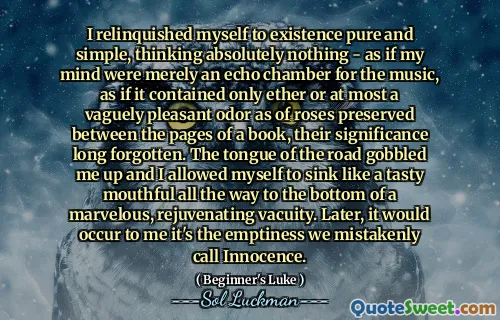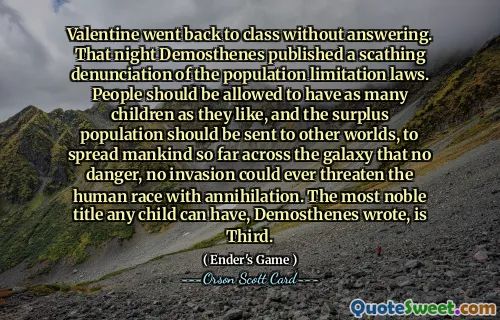
True, beneath the human façade, I was an interloper, an alien whose ship had crashed beyond hope of repair in the backwoods of Southern Appalachia - but at least I'd learned to walk and talk enough like the locals to be rejected as one of their own.
This quote profoundly captures the tension between superficial belonging and deep, unbridgeable alienation. The narrator acknowledges their inherent outsider status — a feeling of being an 'interloper' or 'alien' — despite their efforts to assimilate with their surroundings through adopting local customs and speech. There is a raw vulnerability in admitting that beneath the surface, beneath the human façade we present to others, lies a true self that is often misunderstood or outright rejected. The metaphor of a ship crash in an unfamiliar, remote place amplifies the sense of dislocation and helplessness, highlighting the scars of one's past and identity struggles that cannot simply be fixed or abandoned.
The phrase 'rejected as one of their own' is particularly striking because it suggests that blending in is not synonymous with acceptance. Despite conformity in behavior and language, the narrator remains a perpetual outsider, raising important questions about identity, belonging, and authenticity. This calls to mind the complexities of cultural assimilation and the paradox of seeking acceptance in environments where one's background may always mark them as 'different.' It explores the pain of invisible barriers that prevent true integration, even when surface-level adaptation is achieved.
Ultimately, this quote from 'Beginner's Luke' by Sol Luckman invites reflection on the human need for connection and the elusive nature of true belonging. It encourages readers to look beyond façades—not just in others, but within themselves—and to confront the internal and external aspects of alienation. It reminds us how identity is multi-layered and how sometimes, despite our efforts, we may remain estranged from those around us while continuing the silent quest for understanding and acceptance.







